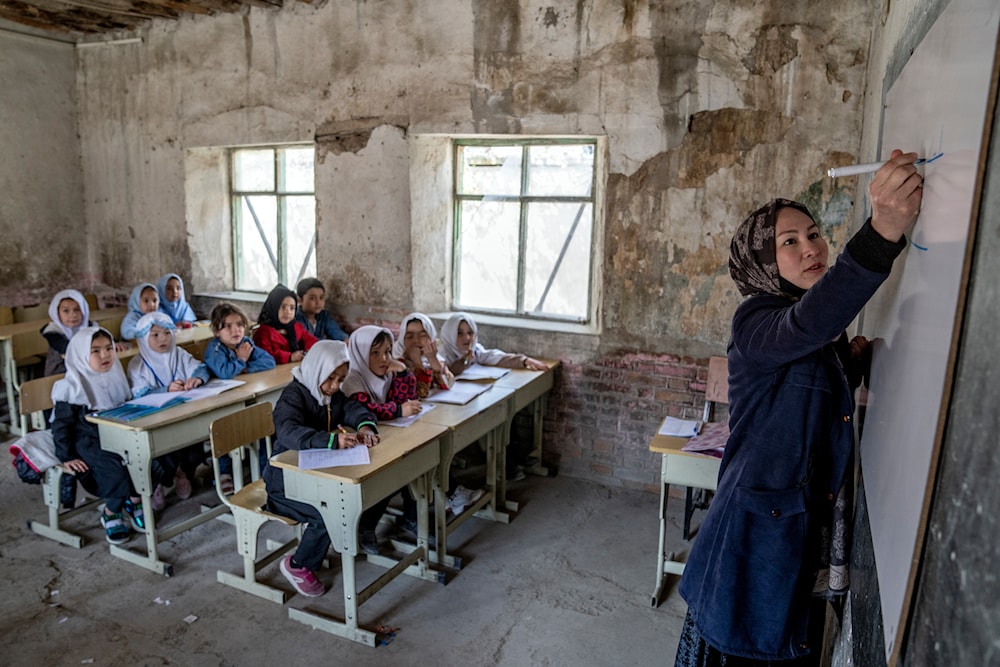Afghan girls deprived of education could top 4M by 2030: UNESCO
UNESCO warns that if the Taliban’s ban on girls’ education continues until 2030, over 4 million girls will be affected, reversing years of progress in women's rights and education in Afghanistan.
-

A teacher leads a class of girls on the first day of the school year, in Kabul, Afghanistan, on March 25, 2023. (AP)
The UN Agency for Education, Science, and Culture, said that Taliban-imposed restrictions on women and girls in Afghanistan have already impacted approximately 1.5 million students, according to a statement from UNESCO.
If these restrictions persist, the number of girls denied access to education could surpass four million by 2030.
"Afghanistan is now the only country in the world where girls do not have the right to attend secondary school. To date, these restrictions have affected around 1.5 million Afghan girls."
"According to new UNESCO data, if the ban continues until 2030, over 4 million girls will be affected," the statement says.
The organization emphasized that this setback had come after years of progress in women's rights and education in Afghanistan, indicating a loss of previously achieved gains.
🔴 Girls’ #RightToEducation is non-negotiable.
— UNESCO 🏛️ #Education #Sciences #Culture 🇺🇳 (@UNESCO) March 8, 2025
Today, Afghanistan is the only country in the world where girls over 12 are forbidden to learn. 1.5 million girls are deliberately denied secondary education. If the ban continues until 2030, over 4 million girls will be affected.… pic.twitter.com/FbxnQdW80y
Such restrictions affect not only the future of individual girls but also the societal and economic development of Afghanistan as a whole.
According to the news portal Khaama Press, even though international organizations, including UNESCO, continue to highlight the serious negative consequences of such policies, the situation of Afghan women and girls remains dire.
Ahead of #InternationalWomensDay, UNESCO gives voice to Afghan girls and women and calls for their rights to be restored.
— UNESCO 🏛️ #Education #Sciences #Culture 🇺🇳 (@UNESCO) March 7, 2025
Among the inspiring figures joining us is Shamsia Hassani, Afghanistan’s first female graffiti artist.
Read more: https://t.co/csMmj6gqmj pic.twitter.com/YRajl5NTGW
Without access to education and basic rights, they are systematically deprived of opportunities that could improve their lives and contribute to the reconstruction of the country.
The publication highlighted that, in the long run, this systemic discrimination will result in significant social consequences, restricting Afghanistan's capacity to advance economically, socially, and politically. It stresses the need for international pressure and support for Afghan women to drive policy changes that foster equality, education, and opportunities for all.
Taliban deputy foreign minister demands opening girls' high schools
In January, the Taliban's acting deputy foreign minister urged his senior leadership to establish schools for Afghan girls, in one of the sharpest public condemnations of a policy that has contributed to the authorities' worldwide isolation.
Sher Mohammad Abbas Stanekzai stated in a speech at the time that limits on girls and women's education were incompatible with Islamic Shariah law, requesting that "leaders of the Islamic Emirate to open the doors of education," according to Tolo, a local broadcaster.
He asserted that injustice was being done against "twenty million people, out of a forty million people population," and noted that "in the time of the Prophet Muhammad (Peace Be Upon Him), the doors of knowledge were open to both men and women."
The statements were among the harshest public criticisms of the school closures by a Taliban official in recent years. Taliban insiders and diplomats have previously told Reuters that the supreme spiritual leader Hibatullah Akhundzada imposed the closures despite internal dissent.

 3 Min Read
3 Min Read








